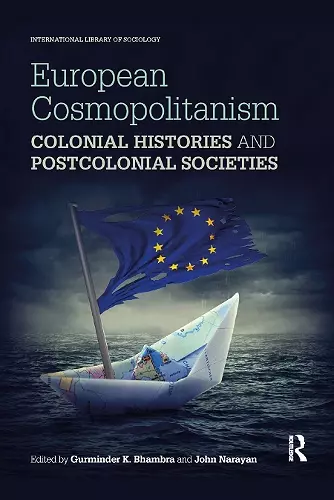European Cosmopolitanism
Colonial Histories and Postcolonial Societies
Gurminder Bhambra editor John Narayan editor
Format:Paperback
Publisher:Taylor & Francis Ltd
Published:12th Dec '19
Currently unavailable, and unfortunately no date known when it will be back
This paperback is available in another edition too:
- Hardback£160.00(9781138961104)

This book provides a fresh examination of the cosmopolitan project of post-war Europe from a variety of perspectives. It explores the ways in which European cosmopolitanism can be theorized differently if we take into account histories which have rarely been at the forefront of such understandings. It also uses neglected historical resources to draw out new and unexpected entanglements and connections between understandings of European cosmopolitanism both in Europe and elsewhere. The final part of the book places European cosmopolitanism in tension with contemporary postcolonial configurations around diaspora, migration, and austerity. Overall, it seeks to draw attention to the ways in which Europe’s posited others have always been very much a part of Europe’s colonial histories and its postcolonial present.
In sharp contrast to the anti-historical, methodological Eurocentrism that has permeated the greater part of scholarly work on ‘Cosmopolitan Europe’, this book applies a rare, let’s call it, methodological cosmopolitanism to its subject matter. In so doing, it not only successfully challenges numerous assumptions and claims concerning the cosmopolitanism in and of Europe (and vice versa). As the book’s contributions amply testify, it also opens the door to a new, highly enlightening and thus utterly central empirical terrain for the field. This book is an achievement that should define the context for future research and intellectual debate.
—Peo Hansen, Professor of Political Science at REMESO, Linköping University
At a time when the EU political project has been called into question as never before in its history, Bhambra and Narayan’s edited collection offers an insightful exploration of the hidden histories that have shaped cosmopolitan Europe, but are largely omitted by its historical canon. By recovering silenced histories, the book provides us with a novel perspective as well as expanded resources with which to address the challenges of our contemporary society.
— Nando Sigona, Birmingham Fellow, Senior Lecturer and Deputy Director of IRiS, Univeristy of Birmingham
This book makes a bold and crucial intervention. It simultaneously challenges the complacencies of elite European self-understandings, whereby an official ideology of European cosmopolitanism in fact reinstates postcolonial historical denial and Eurocentric insularity and excavates the richly cosmopolitan histories of imperial Europe’s inseparability from anti-colonial cosmopolitanisms, that go beyond ‘Europe’. The critical insight and rigor of this collection is indispensable for any serious reflection on the questions of ‘Europe’ and cosmopolitanism.
—Nicholas De Genova, Reader in Human Geography, King’s College London
Whether as idea or ideology, cosmopolitanism has often been seen as the ethical rationale of the trade in goods and meanings. This book presents a far more interesting case for cosmopolitanism. Through intriguing historical narratives, incisive political analysis and sophisticated argument, the authors show that Europe – if there ever was one – is cosmopolitan at its origins. This not because of some ideational kernel of European thought, but because of the presence and practice of subjected and colonized peoples, on whom Europe’s imperial states always relied for its development and prosperity, yet whose part in Europe continues to be unrecognized. This is indispensable reading: a first truly cosmopolitan approach to the history and theory of cosmopolitanism.
—Stefan Jonsson, Professor at the Institute for Research on Migration, Ethnicity and Society, Linköping University
This is an insightful, rigorous and well-timed book, highlighting the historical legacies behind the present migration crisis or the mourning for an enchanted multiculturalism by looking beyond Eurocentric self-reference. In the vast land of forgotten and silenced histories, the authors have found alternative narratives of cosmopolitanism that can help us to understand present European condition and the complex historical intertwinements that constitute it, offering an unconventional analysis of European cosmopolitanism’s sources and ambivalences.
—Paola Rebughini, Professor of Sociology and Intercultural Communication, University of Milan
ISBN: 9780367875404
Dimensions: unknown
Weight: 280g
200 pages